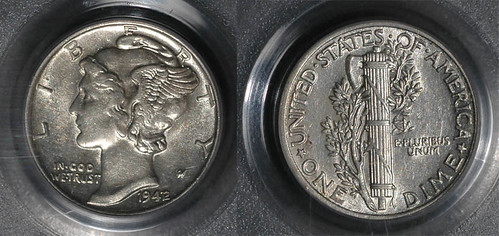
PREV ARTICLE
NEXT ARTICLE
FULL ISSUE
PREV FULL ISSUE
THE 1942/41 OVERDATE DIMES: NOT DOUBLED DIESLast week James Higby wrote: ... the overdated 1918/7-D nickel, the 1943/2-P nickel, both 1942/1 dimes, and the 1918/7-S quarter overdates can also be considered as "doubled" dies. These coins were twice hubbed, once with each date in question. Especially on the dimes, the date numerals show the telltale shift of a slight rotation from the first hubbing to the second, being just slightly out of register. Thus, these overdates can also be considered as "doubled" dies. Tom DeLorey writes: This is in error. The doubling on the 4 on the 1942/41-P and 1942/41-D dimes is the result of the 4 being moved slightly between the master die for 1941 and the master die for 1942. The rest of the design is not doubled. Just the 4 and the 2/1. The Mint's engravers often respaced the third date digit when there was a significant difference in the width of the old fourth digit and the new fourth digit, as happened between 1941 and 1942. Occasionally they would remake the entire date for the sake of artistic balance.
Separately, James Higby had provided to me a photo of one of the dimes, shown here.
-Editor

James Higby adds: The Cherrypicker's Guide has an excellent treatise on doubled dies.
To read the earlier E-Sylum article, see:
NUMISMATIC VOCABULARY: DOUBLED DIE VS DOUBLE DIE
(www.coinbooks.org/esylum_v13n16a12.html)
The Numismatic Bibliomania Society is a non-profit organization promoting numismatic literature. See our web site at coinbooks.org. To submit items for publication in The E-Sylum, write to the Editor at this address: whomren@gmail.com To subscribe go to: https://my.binhost.com/lists/listinfo/esylum All Rights Reserved. NBS Home Page Contact the NBS webmaster 
|